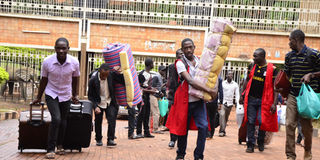Beyond Makerere @100: A case for critical university studies

Makerere University students at their halls of residence. PHOTO/ FILE
What you need to know:
- Now that the celebrations are over, it is time for critical studies that will boldly put the university, and the country’s higher education sector under the microscope with the view to creating an institution that benefits the country.
Founded in 1988, the Islamic University in Uganda could have started earlier. The late Dr Adonia Tiberondwa, a minister at the time the university was first proposed, told me why it did not start earlier: when approached with the proposal for establishment of the university, then president Milton Obote objected to the “in” in the proposed university’s name. The president pitched instead for an Islamic University of Uganda.
By that time, the recommendations of the Visitation Committee to Makerere University College of the University of East Africa (1970) had contributed to the creation in 1971 of Makerere as an independent national university. Actions towards indigenisation of the college—in aspirations, ethos, staffing, and curricula—had been flagged among the committee’s recommendations. According to the committee’s report, similarly nationalistic sentiments had been expressed in Kenya and Tanzania (hence, the University of Nairobi and University of Dar es Salaam).
However, upon taking power in 1986, President Museveni did not fuss about the prepositions in the Islamic University’s name. Hence, it easily opened in 1988. Yet, from demanding that only teaching programmes that are relevant to Uganda’s needs cost taxpayers’ money to spirited efforts to promote patriotism, President Museveni has also been unequivocal in his demand that universities in Uganda be truly Ugandan. Unsuccessfully!
Modelled along Oxbridge, Makerere was yet to shed its (colonial) legacy as an ivory-tower when Museveni took it over as chancellor. Yet, Marion Doro’s incisive review of Carol Sicherman’s Becoming an African University: Makerere, 1922-2000 published 22 years later leads to the conclusion that the question of whether Makerere is an African university or simply a university in Africa was yet to be answered.
Of course, that is not to say that the university had not evolved. It had—as had university education in the country—albeit via the neoliberalism of the country’s structural adjustment programme. Indeed, Prof Mahmood Mamdani’s warts and all exposé, Scholars in the Marketplace: The Dilemmas of Neo-Liberal Reform at Makerere University, 1989-2005, is a rude reminder that it was not yet uhuru at the university.
Similarly, in University Education in Uganda: Challenges and Opportunities for Reform, Prof ABK Kasozi had observed, “Despite the recent expansion of higher education in Uganda, there is still much cause for concern. Enrolment levels lag behind those of much of the rest of the continent; enrolment in technical universities is only one percent; there is no government science and technology policy for higher education despite an identified social need; the new universities are broadly imitating the old colonial models; and there has been little curriculum reform.”
Simply put, nearly four decades after Obote insisted that the Islamic University in Uganda should be a University of Uganda and President Museveni started work in the same direction, the university education sector in the country is still grappling with difficult philosophical questions that are not helped by the country’s colonial past, neocolonial realities, and neoliberalism.
Questions in all the three areas of the National Council for Higher Education’s focus: access, relevance, and quality. Questions of whether there are universities in the country or the country has universities. And rhetorical, but hugely controversial, questions of what universities in the county are for vis-à-vis what they should be for.
At Makerere University, stakeholders spent the better part of 2022 conducting commemorative lectures and celebrations to mark the university’s first centenary despite persistence of these questions. Justifiably; although the university is not without contradictions, in principle failures, it is not without indisputable achievements to celebrate either.
But now that the celebrations are over, and the university determinedly on the road to the future, it is time for critical university studies. Studies that will boldly put the university, and indeed ourselves and the country’s higher education sector generally, under the microscope with the view to imagining and trying to create a university that will be both ours and for us.
The reasons for critical university studies here are all too obvious. Although the university has performed appreciably in various rankings over the years, some have asked a sobering question: “whose rankings?”
Although a sizeable number of women are hired at the entry levels, at the higher ranks of professor, and associate professor, among others, the gender structure is awfully flip-flopped in disfavour of women. A huge number of the university’s graduates struggle to find gainful employment, and stakeholders are polarised on whether this is within the university’s ambit.
As some have argued that the university should be liberal in its programmes, other stakeholders have urged a more vocational, utilitarian, outlook. Although some stakeholders are keen to see the university more internationalised, others would rather a university that prioritises national aspirations.
The place and impact of emerging technologies in the university is also posing difficult questions. Although the reforms implemented at the university starting in the late 1980s have been credited for widening access, some sections of the population continue to be underrepresented. Yet some stakeholders have argued that the widening of access is affecting quality.
Government, foreign, and private funding for the university has also raised difficult questions.
To circumvent its crippling underfunding, the university has placed priority on faculty attracting funding (including in promotion exercises) albeit some have expressed scepticism that donors’ priorities, and not those of faculty, the university and the country, might prevail.
And the list goes on, underlining the need for critical study of the university and similar institutions.
The writer is an Associate Professor of Higher Education at the East African School of Higher Education Studies and Development, Makerere University.
Authored by Jude Ssempebwa




